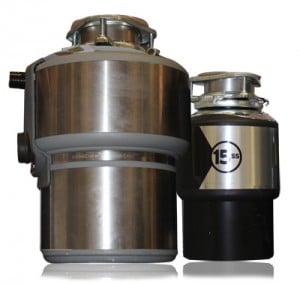
Garbage disposals are a convenient kitchen feature, making it easy to clean up food waste with a flick of a switch. But if your home relies on a septic system rather than a municipal sewer line, you might be wondering if a garbage disposal is doing more harm than good. The short answer is: it depends. While some garbage disposals are designed to be septic-safe, using one without proper precautions can overwhelm your septic system and lead to expensive problems down the line.
If you’re using or considering a garbage disposal with a septic tank, it’s important to understand how the two systems interact, what potential risks exist, and how to properly maintain both to keep your home running smoothly.
How Septic Systems Work
A septic system is a self-contained, underground wastewater treatment system that handles everything from your sinks, toilets, showers, and appliances. Wastewater flows into a septic tank, where solids settle to the bottom and are broken down by bacteria, while liquids flow out to a drain field for filtration into the soil.
Because this system relies on natural bacterial processes and limited space, introducing excess solid waste—or the wrong kind of waste—can interfere with its ability to function.
What Happens When You Add a Garbage Disposal to the Mix
Garbage disposals are designed to shred food waste into small particles so it can pass through your plumbing. When connected to a sewer system, municipal treatment facilities handle this food waste. But with a septic system, all that ground-up food ends up in your septic tank, where it must break down just like human waste and other solids.
The problem is that many food scraps—especially fats, grease, coffee grounds, and fibrous vegetables—don’t decompose easily and can accumulate in the tank, reducing its capacity and increasing the frequency of pump-outs. This can lead to backups, clogs, and even septic system failure, which can be costly and hazardous.
Check out this article from the University of Arizona discussing how food waste affects septic systems and why your disposal habits matter.
What the Experts Say About Garbage Disposals and Septic Tanks
There’s no universal rule saying garbage disposals are unsafe for septic systems, but they are generally discouraged unless managed carefully. Some manufacturers even offer “septic-assist” garbage disposals that inject enzymes or bacteria to help break down food waste more effectively. Still, even these systems have limitations and should be used with caution.
According to Scientific American, garbage disposals can increase the solid content in your septic tank by up to 50%, leading to more frequent maintenance and potential long-term problems if not carefully monitored.
Best Practices If You Use a Garbage Disposal with a Septic System
If you already have a garbage disposal or plan to install one in a home with a septic system, following these guidelines can help reduce the risk of damage:
- Limit what goes down the drain: Avoid putting grease, oil, bones, pasta, coffee grounds, and stringy vegetables like celery into the disposal.
- Use cold water when running the disposal to help solidify fats so they can be ground up and flushed away more effectively.
- Run the disposal longer than you think you need to—at least 30 seconds—to ensure food is fully broken down and flushed out of the system.
- Schedule more frequent septic inspections: If you’re using a garbage disposal, plan for inspections every 1 to 2 years instead of the typical 3 to 5.
- Pump your septic tank more often: Depending on household size and usage, many experts recommend pumping every 1 to 3 years if you use a garbage disposal.
When a Garbage Disposal Might Not Be Worth It
If your household uses a septic system and you already struggle with backups, pooling water near the drain field, or unpleasant odors, adding a garbage disposal could worsen the situation. In these cases, composting or simply scraping food into the trash may be a safer, more sustainable option.
If you’re committed to keeping your disposal, you may also want to consider adding a grease trap or enzyme-based septic treatment to help your tank manage the additional solids.
Final Thoughts from Drain Masters – Septic-Friendly Plumbing in San Diego
Ultimately, whether or not a garbage disposal is safe for your septic system depends on how it’s used and how well your septic system is maintained. If you’re not sure whether your setup can handle the added load—or you’re already seeing warning signs like slow drains, foul odors, or wet patches in your yard—it’s time to talk to a professional. Drain Masters provides trusted garbage disposal and septic system evaluations in San Diego, helping homeowners make informed decisions that protect their homes and avoid costly repairs.

